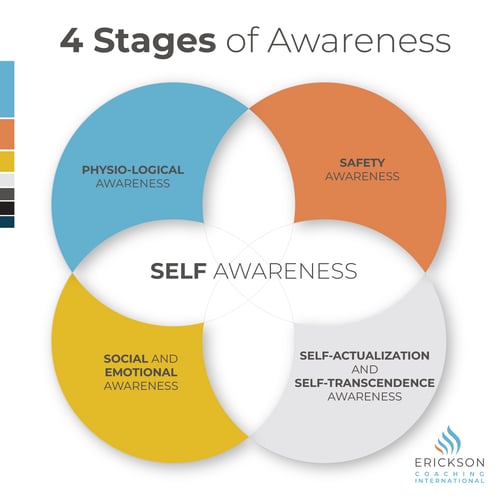In the realm of personal development and coaching, understanding the different stages of awareness is like holding a compass to guide us through the intricate terrain of human growth and fulfillment. Rooted in Abraham Maslow's Hierarchy of Needs, these four stages represent not just a psychological framework but a roadmap for coaches and their clients. Join me on this intellectual exploration as I delve into the nuances of each stage, their relevance to coaching, and the transformative potential they hold for those seeking personal growth and self-fulfillment.
Stage 1: Physiological Awareness
At the very core of our being lies the awareness of our physiological needs. Think of it as the foundation upon which the entire structure of our well-being is built. As coaches, it's crucial to recognize that many individuals may find themselves in this stage, grappling with the basics of survival. Whether it's addressing hunger, securing shelter, or ensuring access to clean water, physiological awareness is where it all begins.
However, this stage is not limited to material necessities alone. It also encompasses the awareness of the body itself—its health, comfort, and vitality. Coaches working with clients at this stage often focus on facilitating them to meet these fundamental needs, creating a stable platform from which further growth can occur.
Stage 2: Safety Awareness
With the physiological needs met, the spotlight shifts to safety and security. Individuals become keenly aware of their desire for physical safety, financial stability, and a predictable environment. Coaches play a pivotal role here by facilitating the client navigation of these concerns, whether by addressing financial worries, establishing healthier routines, or creating a safe space for emotional expression.
Safety awareness extends beyond the physical realm; it encompasses emotional safety as well. Clients may seek reassurance and stability in their relationships, yearning for a sense of trust and dependability. Coaches facilitate in building emotional resilience and fostering secure connections, helping them lay the groundwork to venture into deeper levels of awareness.
Stage 3: Social and Emotional Awareness
As clients ascend the hierarchy, they enter the realm of social and emotional awareness. Here, individuals yearn for connections, seek meaningful relationships, and explore their emotional well-being. Coaches in this stage facilitate clients on a journey of self-discovery, empowering and supporting them to understand their emotional landscape and navigate the intricacies of human interactions.
Empathy and active listening become powerful tools in the coach's arsenal at this stage. Clients look to their coaches not only for guidance but for compassionate companionship on their quest for deeper emotional awareness. It's a phase where clients may explore their values, beliefs, and aspirations, as well as develop a profound understanding of their own emotions and those of others.
Stage 4: Self-Actualization and Self-Transcendence Awareness
The pinnacle of Maslow's hierarchy leads us to the realm of self-actualization and self-transcendence awareness. Here, individuals strive for personal growth, self-fulfillment, and a connection to something greater than themselves. Self-actualization involves the realization of one's potential, talents, and passions. Coaches facilitate clients in setting and achieving meaningful goals, fostering creativity, and nurturing a sense of purpose. Moreover, this stage also encompasses self-transcendence, where clients explore a sense of connection to a higher purpose or spirituality. Coaches may facilitate clients in their quest for transcendent experiences and a deeper understanding of their role in the broader world.
The Interplay of Stages
While we have explored these stages sequentially, it's important to note that the journey of awareness is often more complex. Clients can find themselves concurrently in multiple stages, each one influencing the other. For example, a client may be in the process of self-actualization (Stage 4) while still grappling with elements of emotional awareness (Stage 3). Coaches need to be attuned to these intricacies, understanding that growth is not always a linear progression.
Moreover, the interplay of these stages highlights the holistic nature of personal development. An individual may reach a level of self-actualization, but external factors or challenges may temporarily regress them to safety or even physiological awareness. As such, coaches must remain adaptable, empathetic, and non-judgmental, creating a safe space for clients to explore their awareness at any stage.
The Role of Coaching
In each of these stages, the role of a coach is multi-faceted. Coaches serve as facilitators, illuminating the path ahead and helping clients chart a course toward their goals. They are motivators, inspiring clients to transcend their limits and reach new heights. They are listeners, offering a non-judgmental ear for clients to express their fears, hopes, and dreams.
However, perhaps the most essential role of a coach is that of a mirror. Coaches hold up a reflective surface to their clients, helping them gain insight into their thoughts, feelings, and behaviors.
Conclusion
The four stages of awareness—physiological, safety, social and emotional, and self-actualization and self-transcendence—form the foundation of personal growth and self-fulfillment. In the realm of coaching, they serve as a roadmap, guiding both coaches and clients towards a more profound understanding of human needs and aspirations.
As coaches, our duty is to be adaptable, compassionate, and well-versed in the complexities of these stages. We must meet clients where they are on their journey, offering unwavering support and facilitation as they navigate the ebb and flow of awareness.
In this dynamic interplay of stages, coaching becomes a transformative partnership. It's a journey where clients ascend the hierarchy of awareness, discovering their true potential, and embracing a life of self-discovery, growth, and fulfillment. Ultimately, as coaches, we have the privilege of illuminating the path and walking alongside our clients, witnessing their evolution into the fullest expression of themselves.

_Primary%20-%20Full%20Colour%20(1).png?width=8000&height=2189&name=Erickson%20Logo%20Kit%20(050924)_Primary%20-%20Full%20Colour%20(1).png)


